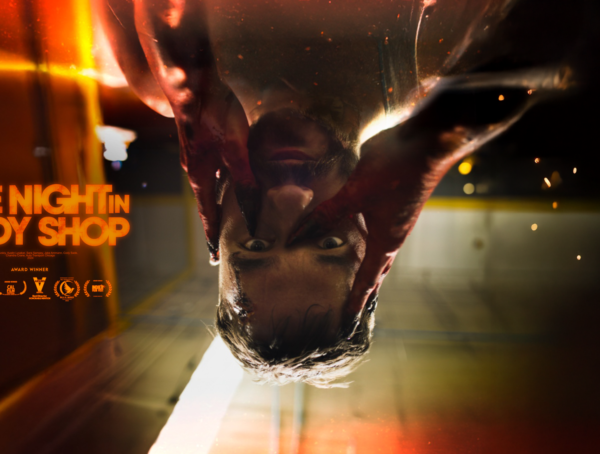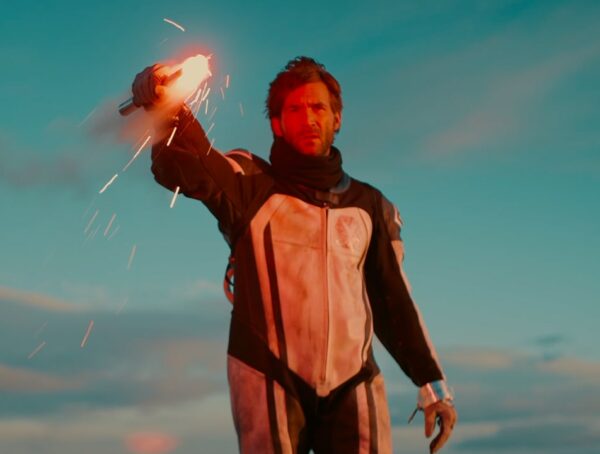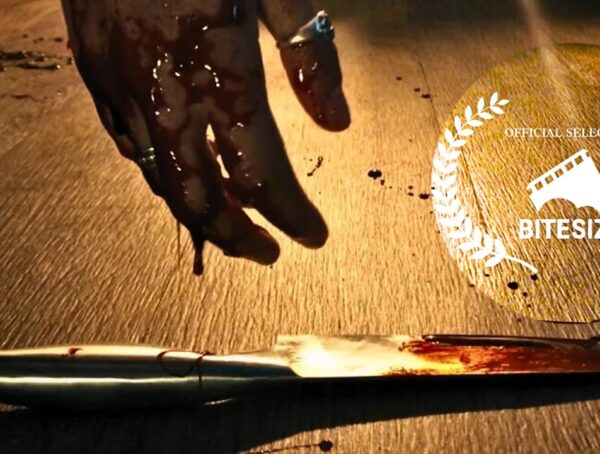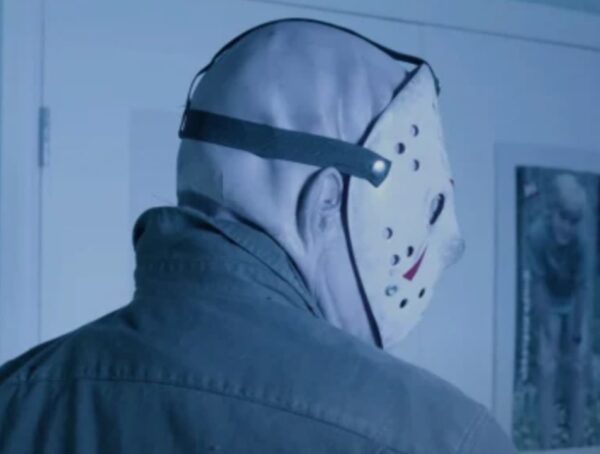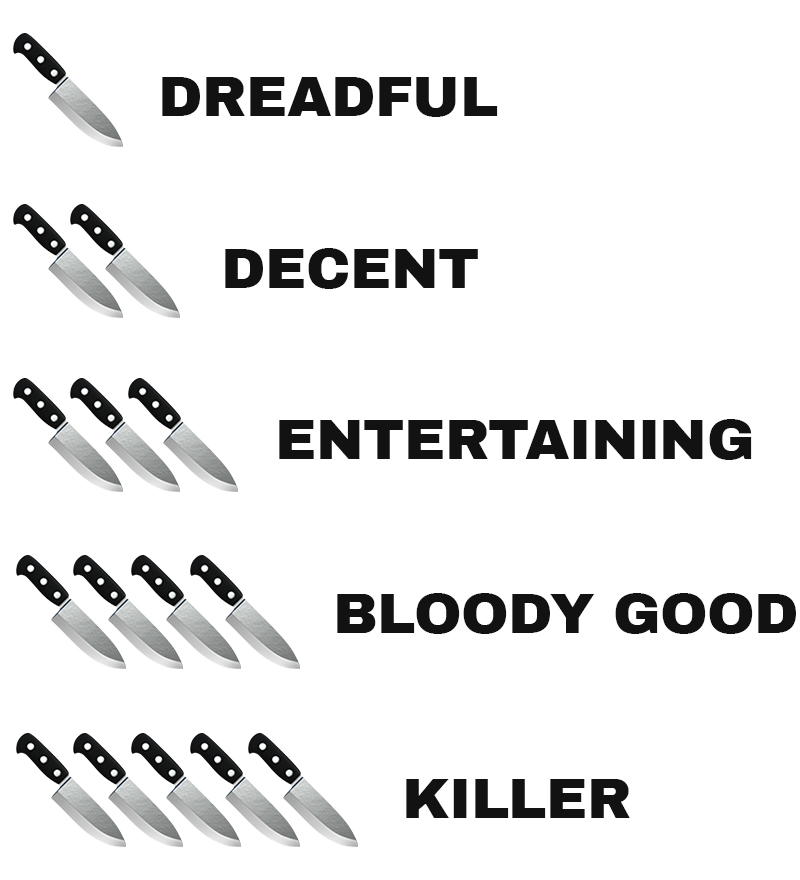The Man Who Became Everything is a new psychological horror short written by Barry Germansky and directed by Michael Alexander Uccello of Metal Monster Productions.
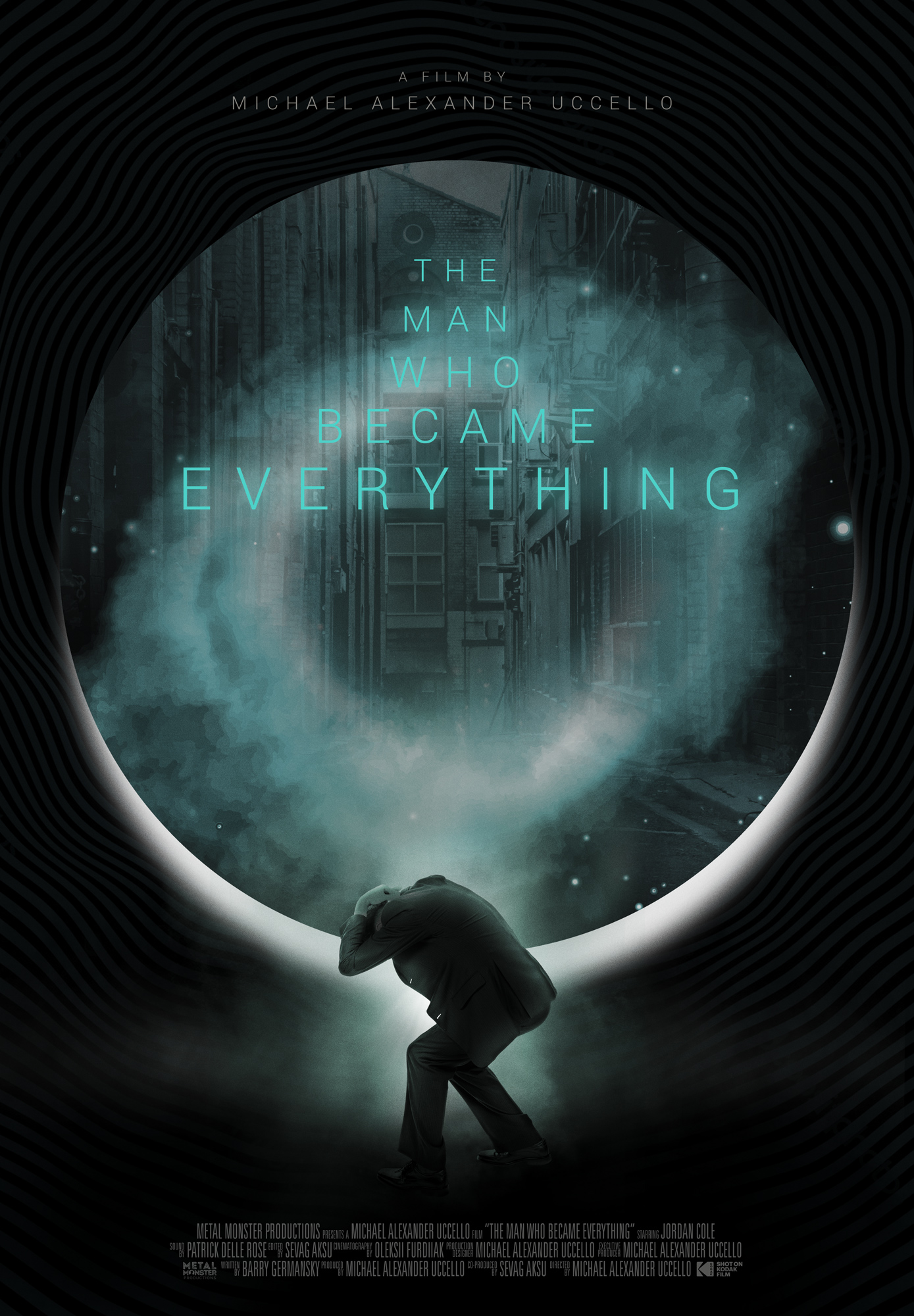
The last human survivor of an unknown invasion is stalked by interdimensional entities that have plotted humanity’s extinction. Driven to madness, the man escapes his self-quarantine to finally face the horror of becoming everything.
Quick Cuts: Director Michael Alexander Uccello delivers high-tension in this hypnotic, psychological short that tackles themes of self-isolation and extinction. The Man Who Became Everything puts viewers in the sole human’s engrossing point of view; a feeling of being consumed while time quickly dwindles away. Suspense is built, not by what the viewer sees, but by what is experienced through interpretation. Cinematography matches the mood of the film with dark, industrial visuals and quick flashes of a fascinating unknown entity. 4 knives
A Q&A with Director Michael Alexander Uccello below.
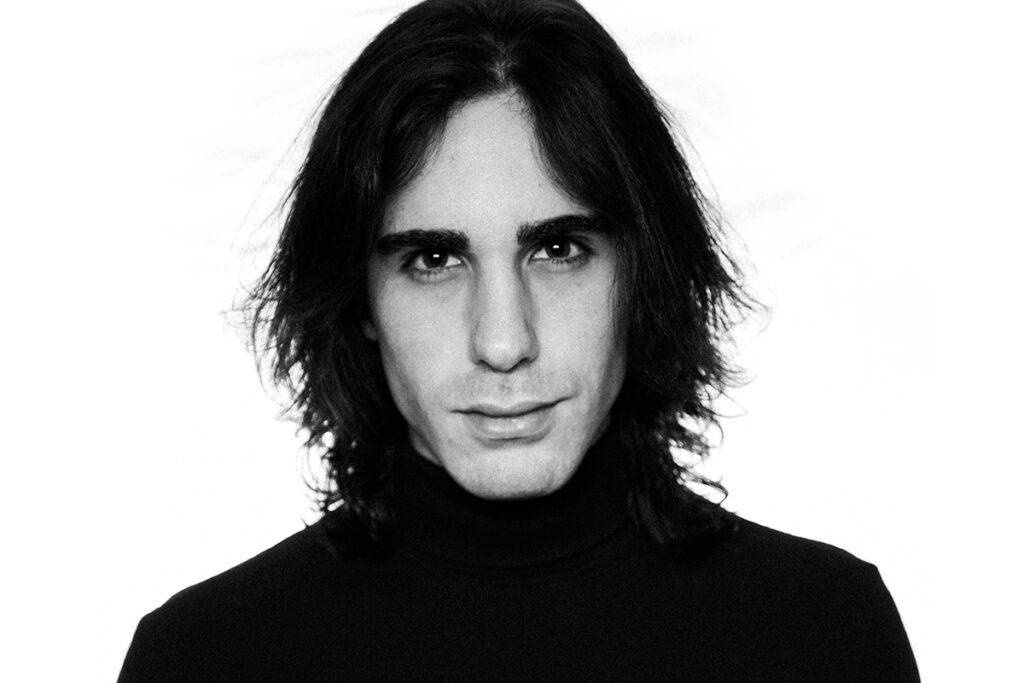
Congratulations on the release of The Man Who Became Everything. It’s apparent you had a solid vision for this project and you demonstrated a high level of creativity. What was your directorial concept for the film and what are you hoping people take from it?
Michael Alexander Uccello: Thank you. What a lot of people don’t know about this film is that it was written, shot, and produced in 10 days during the state of emergency in downtown Toronto, Canada. The reason I mention this is because it has a lot to do with the actual concept of the film and the intuitive process behind our creativity. Thanks to Barry Germansky, the writer, who drafted up a screenplay rich enough to work with throughout the week, it really evolved conceptually.
The film is an immediate product of my own fears during the pandemic… the terror of something so sudden, unknown and life-threatening out there… outside… invisible… and so immeasurably widespread that it’s being experienced around the world and nobody can stop it. I was fascinated by the nature of this virus, not as some infectious agent but as a cosmic entity looking to consume all of humanity, and there is just one person left (Jordan Cole, the actor), our last man on earth. I want people to be reminded of the dreary loneliness each of us felt during the lockdown, to remember how desperate and curious we all were to go outside and see what the hell was going on, out of sheer boredom! Hence, the concept revolves around a major part of every human being– the blind, desperate, naive and heroic search for an answer. A seeking at all costs… even in sacrifice. The film’s opening title card says it all, “all beings exceed our power of measurement”.

The concept revolves around a major part of every human being– the blind, desperate, naive and heroic search for an answer. A seeking at all costs… even in sacrifice. The film’s opening title card says it all, “all beings exceed our power of measurement”.
— Michael Alexander Uccello
The Man Who Became Everything is quite different from previous Metal Monster films we’ve featured. Is this a new direction of filmmaking you’re heading towards?
MAU: I appreciate this question a lot. It is indeed different from the previous Metal Monster films you’ve featured, such as ‘Angel’, ‘The Door Down the Hall’, and ‘Dreamcatcher’ but that’s because it aims for something different. Speaking on behalf of myself and the production company, we have given each other the creative freedom to develop and become the artists we believe ourselves to be. I felt like this film, compared to the previous ones I have directed, has a stronger voice, clearer direction, and braver presentation. I personally see myself exploring deeper into the arthouse realm of cinema, after all, it is a visual language I seem to resonate, connect with and understand more and I think that’s the most important thing you can do for yourself as a director or artist… to not identify exactly who you are, but exactly how you communicate.
The film is quite topical as you mentioned, presenting themes of self-isolation and loneliness. Was the current pandemic the sole influence for the screenplay?
MAU: Absolutely. In fact, the pandemic influenced every single decision made henceforth. As mentioned above, the film was shot and produced in just over a week on a format none of us had any experience with, Super 16mm film, during the pandemic and state of emergency, no doubt a recipe for disaster for our 5 person skeleton crew – but like I said, there was something about the script and the themes we were trying to convey which worked so well for the time and answered so many of our questions that we had in the strange strange madness which came to be in March 2020. The story of this film and how it came to be can be summed up into a small phrase we obsessively muttered throughout each day in the making of, “this film should not exist!”. O’ how many factors we were at the mercy of… if it wasn’t for this team of brave and pure artists, Sevag Aksu (Editor and Co-Producer), Oleksii Furdiiak (Cinematographer), Patrick Delle Rose (Composer and Grip), Andrii Shtakal and Jose Perron (1st AC), Julian Vetrone and Chistian Vetrone (SPFX team) this film would have indeed not existed. We wanted to capture, into that silver celluloid, the essence of emptiness which plagued each and every city across the world… COVID-19 and its unknown threat on humanity. We were living in a Lovecraftian world, all that was needed was for somebody to capture it. I have never been so proud of a team in all of my experiments and experience. I thank each and every one of them.

A lot of the tension in the film is based on what the viewer doesn’t see on screen. Do you think leaving elements to the viewer’s imagination is a more successful tactic when creating a horror film?
MAU: I believe leaving elements to the viewer’s imagination is a successful tactic in every genre of film… from the tight, slow and smooth pans of an erotic sex scene to the slow pull-out in a suspense horror film, its the best way to make the viewer empathize with the scene… they fantasize about it while watching, like a living daydream (or nightmare). For this reason, it is no surprise that H.P Lovecraft was the largest influence for us in the making of this film… master of the ‘fear of the unknown’ and ‘unimaginable’. Sometimes the best directing doesn’t involve what is seen on screen but that which is not seen, off-screen, that profoundly affects our minds.
I noticed a lot of symbolism in the film, from the water slowly running down the drain, to the dark tunnel with beams of light at the end. In addition to that, the colour scheme consisted of mostly deep blues and a lack of brightness throughout. Tell us about the atmosphere you were hoping to achieve.
MAU: We knew every shot had to mean more than just something, especially since it was a virgin experience shooting with film, we knew what we wanted and hoped that it showed up in the scans and luckily for us it did. The visual symbolism and creativity first and foremost could not have been achieved without the tight and tireless Oleksii Furdiiak, the cinematographer, who understood what the film was trying to convey. There was a lot of depth to the images, an ambiguous nature of what is and what is not, hence the psychological terror of it all. The picture was married to the rhythm and that can be seen in the editing, the patience of each cut, thanks to Sevag Aksu who understood exactly how to create a deeply mad, hypnotic, and trance-inducing film. I mean, some shots hold for about 20 percent of the film! Then there was the original score by Patrick Delle Rose and that alone can make you sink into oblivion like the water slowly running down the drain. Altogether, we understood this film was more of an experience than it was an actual narrative and we wish for the people who watch it to feel that too. I won’t go deeper into what we were trying to achieve because that’s why the film was made, if I could explain it then it would have never needed to be.

I know the film has a festival run coming up. Where can people see it on screen and when is its expected release date?
MAU: The film has been officially selected at the 25th Annual H.P Lovecraft Film Festival in Portland, Oregon and Kinoskop Festival in Belgrade, Serbia. I am hoping that the film will play at many more for there is a long list of festivals yet to announce their line-ups throughout 2020 and 2021. If all goes well I hope to have its first theatrical presentation at a local Toronto festival in 2021. I won’t say which!
Also, next month I will be shooting my next short film FROM BEYOND, an adaptation of the H.P Lovecraft story, part of an anthology feature with the same team plus a strong addition to the production team, David James (Producer), and Shelly Abramovich (Production Designer). The release date is TBD but we will be posting updates and lots of media showcasing the new project, so remember to look out for it.
Stay up to date on upcoming films from Metal Monster Productions here.
Sponsored Feature: Metal Monster Productions
You might also like
More from Indie Horror
The Forest – A Post-Apocalyptic Thriller with a Romantic Twist
Sponsored Feature: Twin Hearts Productions in association with Sonvelt Media The Forest is a post-apocalyptic romantic drama written by Reine Swart …
Under Control (Reworked) (Reclaimed) (Re-released)
Sponsored Feature: SimmeringFire Productions Under Control is a gripping psychological horror short written/produced by Jazmine Cornielle and directed by Jenna Brady. …
Loose Ends: Victim No More Part II – A Friday the 13th Anthology Sequel
Sponsored Feature: 3PD FILMS Loose Ends: Victim No More Part II is a feature-length anthology sequel to the short Friday the 13th …


